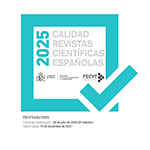Del ser al deber ser. La ética ontológica de Antonio Rosmini
Resumen
El ensayo expone críticamente la fundamentación ontológica de la ética en Antonio Rosmini. Al mismo tiempo, propone una solución al problema de Hume sobre la deducción de proposiciones normativas a partir de las descriptivas. Rosmini parte del análisis del conocimiento. Desde aquí consigue acreditar el paso del pensamiento al ser, distinguiendo tres modos: ser real, ideal y moral. El filósofo identifica el tercero con una estructura agradable en todo lo naturalmente existente. Catalogar esta dimensión ontológica le permite definir el bien universal como el orden amable del ser, y así conectar modernamente con la filosofía antigua. Mediante la contemplación del bien intrínseco de todo ente natural, del orden particular de su esencia, Rosmini puede validar también el salto del ser al deber ser. En efecto, pues del bien propio de cada realidad se desprende una necesidad objetiva, que a su vez aterriza en la constitución intelectiva y volitiva de la persona como necesidad subjetiva. El bien moral consistirá precisamente en el reconocimiento del sujeto de ese bien necesario
Descargas
Descarga artículo
Licencia
La revista Logos. Anales del Seminario de Metafísica, para fomentar el intercambio global del conocimiento, facilita el acceso sin restricciones a sus contenidos desde el momento de su publicación en la presente edición electrónica, y por eso es una revista de acceso abierto. Los originales publicados en esta revista son propiedad de la Universidad Complutense de Madrid y es obligatorio citar su procedencia en cualquier reproducción total o parcial. Todos los contenidos se distribuyen bajo una licencia de uso y distribución Creative Commons Reconocimiento 4.0 (CC BY 4.0). Esta circunstancia ha de hacerse constar expresamente de esta forma cuando sea necesario. Puede consultar la versión informativa y el texto legal de la licencia.











